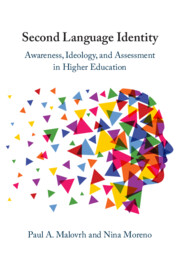Book contents
- Second Language Identity
- Second Language Identity
- Copyright page
- Dedication
- Contents
- Figures
- Tables
- Preface
- Acknowledgments
- 1 On Actors, Architecture, and L2 Advancedness in Higher Education
- Part I Advancedness and the L2 Learner
- 2 Advancedness, Advanced Proficiency, and L2-Spanish Learner Identity
- 3 A Quantitative Analysis of L2 Learners’ Beliefs Regarding Advanced L2-Spanish and Their Perceptions of Advancedness
- 4 Can L2 Learners Imagine Advancedness?
- Part II Variable Notions of Advancedness
- Part III Assessment, Identity, and Critical Language Awareness As Markers of Advancedness
- Book part
- Bibliography
- Name Index
- Subject Index
3 - A Quantitative Analysis of L2 Learners’ Beliefs Regarding Advanced L2-Spanish and Their Perceptions of Advancedness
from Part I - Advancedness and the L2 Learner
Published online by Cambridge University Press: 27 July 2023
- Second Language Identity
- Second Language Identity
- Copyright page
- Dedication
- Contents
- Figures
- Tables
- Preface
- Acknowledgments
- 1 On Actors, Architecture, and L2 Advancedness in Higher Education
- Part I Advancedness and the L2 Learner
- 2 Advancedness, Advanced Proficiency, and L2-Spanish Learner Identity
- 3 A Quantitative Analysis of L2 Learners’ Beliefs Regarding Advanced L2-Spanish and Their Perceptions of Advancedness
- 4 Can L2 Learners Imagine Advancedness?
- Part II Variable Notions of Advancedness
- Part III Assessment, Identity, and Critical Language Awareness As Markers of Advancedness
- Book part
- Bibliography
- Name Index
- Subject Index
Summary
The present study quantitatively identifies undergraduate L2 Spanish learners’ beliefs regarding advanced-language use to determine if they influence how they perceive advanced Spanish, how they differentiate between different levels of intercultural competence, and how they rate overall language use of advanced L2 speakers. We found a disparity between L2 beliefs and behaviors, in terms of what they consider the most important, compared to what they are most sensitive to when evaluating the Spanish of advanced L2 speakers. We associate the disparity with constraints imposed institutionally by higher education and called for a reevaluation of societal and professional demands for advanced-language use, as well as academia’s institutionalized conceptualization of it, in order to generate greater synergy between students, language programs in higher education, and society at large. Doing so requires the implementation of assessment metrics measuring multiple dimensions of language use, and will ultimately facilitate the transformation of curricula and outcomes to more effectively meet the demands of the globalized landscape.
Keywords
- Type
- Chapter
- Information
- Second Language IdentityAwareness, Ideology, and Assessment in Higher Education, pp. 33 - 61Publisher: Cambridge University PressPrint publication year: 2023



